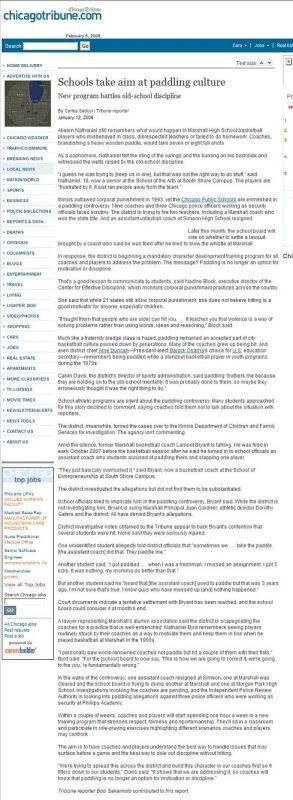|
Corpun file 20932

St Joseph News-Press, Missouri, 11 January 2009
District eliminates corporal punishment
By Alonzo Weston
The St. Joseph School District will spare the rod. School
paddlings are now a thing of the distant past as the Board of
Education recently voted to abolish corporal punishment in the
district.
Corporal punishment has rarely been used in the district in
recent years. Alternative methods of discipline have proven to be
more effective, said Brian Shindorf, assistant director of
elementary education for the district.
"I think the reason the board made that decision is
because it represents our philosophy," he said. "The
truth is, none of our administrators have used corporal
punishment in a long time."

Click to enlarge |
School policy for years said that corporal punishment as a
measure of correction was permitted only after all other
reasonable means had failed. It was to be administered by the
principal in the presence of a teacher, and the
parents were to be informed. The school policy also stated
that corporal punishment preferably was to be administered
"by swatting the buttocks with a paddle, or swatting the
hands is also acceptable."
Megan Dilley, a parent, agreed with the elimination of
corporal punishment. If a punishment is going to involve spanking
or any other physical measure, it should be done by the parents,
she said.
"I think it's the parents' job to stand up and take
care of and teach their children right from wrong, instead of
leaving it up to the teachers," Mrs. Dilley said.
"Parents need to stand up and be responsible for their
children and their children's actions."
Mrs. Dilley and her husband, Chris, have an 8-year-old son who
attends a local parochial school and a 4-year-old daughter at
home. She said they use other forms of discipline in the home,
but a spanking is not out of the realm of possibilities.
"I don't do it on a general basis," Mrs. Dilley
said. "They have other rules of discipline, they get
warnings, they get time out, they get toys taken away," she
said.
Corporal punishment is becoming a relic of the past in area
public and private schools.
At St. Joseph Christian School, it's on the policy books as
a disciplinary tool for elementary students.
Danny Maggart, St. Joseph Christian secondary principal,
notes Proverbs 13:24: "He who spareth the rod hateth his
son: but he that loveth him correcteth him betimes."
"Certainly the verse is one that can be interpreted that
way," he said. "And certainly we feel like here that
form of discipline doesn't go against the Bible."
But corporal punishment is still a last-resort measure, he
added.
"If it were to take place, both parents would have to
approve it and we'd have an adult witness there," Mr.
Maggart said. "We really partner with the parents and work
closely with them when it comes to all aspects of
discipline."
Amy May said she didn't grow up in a time when spankings in
school were the norm. As principal of Spickard R-II Elementary
School, she wasn't going to allow it there, either.
"We have it in the handbook to use with the parents'
permission. I haven't used it and probably will not use
it," she said.
But Lisa Hyatt, another St. Joseph parent, said she thinks the
school district should keep corporal punishment as an option. She
has one child at Central High School and another at Truman Middle
School, and if they deserve a spanking, she doesn't see a
problem with that.
"If it gets out of hand, I can understand it," she
said. "I don't see any reason why they can't keep it in
the system. I don't see nothing wrong with it, I really don't."
Corpun file 20943

Chicago Tribune, 12 January 2009
Schools take aim at paddling culture
New program battles old-school discipline
By Carlos Sadovi
Tribune reporter
Akeem Nathaniel still remembers what would happen to Marshall
High School basketball players who misbehaved in class,
disrespected teachers or failed to do homework: Coaches,
brandishing a heavy wooden paddle, would take seven or eight full
shots.
As a sophomore, Nathaniel felt the sting of the swings and the
burning on his backside and witnessed the welts raised by the
old-school discipline.

Click to enlarge |
"I guess he was trying to [keep us in line], but that was
not the right way to do stuff," said Nathaniel, 18, now a
senior at the School of the Arts at South Shore Campus. The
players are "frustrated by it. It just ran people away from
the team."
Illinois outlawed corporal punishment in 1993, yet the Chicago
Public Schools are enmeshed in a paddling controversy. Nine
coaches and three Chicago police officers working as security
officials faced scrutiny. The district is trying to fire two
teachers, including a Marshall coach who won the state title. And
an assistant volleyball coach at Simeon High School resigned.
Later this month, the school board will vote on whether to settle
a lawsuit brought by a coach who said he was fired after he tried
to blow the whistle at Marshall.
In response, the district is beginning a mandatory character
development training program for all coaches and players to
address the problem. The message? Paddling is no longer an option
for motivation or discipline.
That's a good lesson to communicate to students, said Nadine
Block, executive director of the Center for Effective Discipline,
which monitors corporal punishment practices across the country.
She said that while 21 states still allow corporal punishment,
she does not believe hitting is a good motivator for anyone,
especially children.
"It taught them that people who are older can hit you. . . .
It teaches you that violence is a way of solving problems rather
than using words, ideas and reasoning," Block said.
Much like a fraternity pledge class is hazed, paddling remained
an accepted part of city basketball culture passed down by
generations. Many of the coaches grew up being hit. And even
district chief Arne Duncan -- President-elect Barack Obama's
choice for U.S. education secretary -- remembers being paddled
while a standout basketball player in youth programs during the
1970s.
Calvin Davis, the district's director of sports administration,
said paddling "bothers me because they are holding on to the
old-school mentality. It was probably done to them, so maybe they
erroneously thought it was the right thing to do."
School athletic programs are silent about the paddling
controversy. Many students approached for this story declined to
comment, saying coaches told them not to talk about the situation
with reporters.
The district, meanwhile, turned the cases over to the Illinois
Department of Children and Family Services for investigation. The
agency isn't commenting.
Amid the silence, former Marshall basketball coach Lamont Bryant
is talking. He was fired in early October 2007 before the
basketball season after he said he turned in to school officials
an assistant coach who students accused of paddling them and
slapping one player.
"They just basically overlooked it," said Bryant, now a
basketball coach at the School of Entrepreneurship at South Shore
Campus.
The district investigated the allegations but did not find them
to be substantiated.
School officials tried to implicate him in the paddling
controversy, Bryant said. While the district is not investigating
him, Bryant is suing Marshall Principal Juan Gardner, athletic
director Dorothy Gaters and the district. All have denied
Bryant's allegations.
District investigative notes obtained by the Tribune appear to
back Bryant's contention that several students were hit. None
said they were seriously injured.
One unidentified student allegedly told district officials that
"sometimes we . . . take the paddle, [the assistant coach]
did that. They paddle me."
Another student said, "I got paddled . . . when I was a
freshman. I missed an assignment. I got 3 licks. It was nothing,
my momma do better than that."
But another student said he "heard that [the assistant
coach] used to paddle but that was 3 years ago. I'm not sure
that's true. I know guys who have messed up [and] nothing
happened."
Court documents indicate a tentative settlement with Bryant has
been reached, and the school board could consider it at month's
end.
A lawyer representing Marshall's alumni association said the
district is scapegoating the coaches for a practice that is
well-entrenched. Nathaniel Byrd remembers seeing players
routinely struck by their coaches as a way to motivate them and
keep them in line when he played basketball at Marshall in the
1960s.
"I personally saw world-renowned coaches not paddle but hit
a couple of them with their fists," Byrd said. "For the
[school] board to now say, 'This is how we are going to correct
it, we're going to fire you,' is fundamentally wrong."
In the wake of the controversy, one assistant coach resigned at
Simeon, one at Marshall was cleared and the school board is
trying to dump another at Marshall and one at Morgan Park High
School. Investigations involving five coaches are pending, and
the Independent Police Review Authority is looking into paddling
allegations against three police officers who were working as
security at Phillips Academy.
Within a couple of weeks, coaches and players will start spending
one hour a week in a new training program that stresses respect,
fairness and sportsmanship. They'll sit in a classroom and
participate in role-playing exercises highlighting different
scenarios coaches and players may confront.
The aim is to have coaches and players understand the best way to
handle issues that may surface before a game and the best way to
dole out discipline without hitting.
"We're trying to spread this across the district and build
this character in our coaches first so it filters down to our
students," Davis said. "It shows that we are addressing
it, so coaches will know that paddling is no longer an option for
motivation or discipline."
Tribune reporter Bob Sakamoto contributed to this report.
Copyright © 2009, Chicago
Tribune
| |
About this website
Search
Article: American school paddling
Other external links: US school CP
Archive 2006: USA
Archive 2007: USA
Archive 2008: USA
Archive 2009: USA
Video clips
Picture index
Previous month
Following month
|


![]()